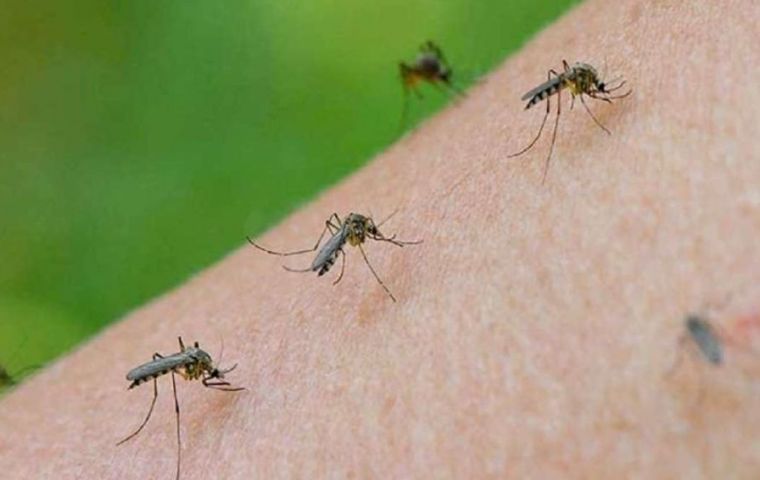MercoPress. South Atlantic News Agency
Buenos Aires under heavy mosquito invasion
 The Aedes albifasciatus species is not the one that spread the dengue virus
The Aedes albifasciatus species is not the one that spread the dengue virus In Argentina, the City and Province of Buenos Aires are going through a “peak of abundance” of the Aedes albifasciatus mosquito, which has led specialists to recommend the citizenry to up all preventive measures and use repellents, mosquito nets, and wear long-sleeve clothing. These insects are said to be behind the spread of the Western Equine Encephalitis virus (WEE).
“This is a peak of abundance of the Aedes albifasciatus species after a rainy season, a phenomenon that mainly affects the Pampa region where large puddles are formed,” indicated Maximiliano Garzón, researcher of the Mosquito Study Group of the School of Exact and Natural Sciences (FCEN) of the University of Buenos Aires (UBA).
After abundant rains in the region, the flooded areas become a favorable environment for the simultaneous hatching of the eggs of the so-called “flood mosquito,” he also explained.
“This peak of abundance will be waning down in 10 days or a week, although it depends on whether it rains again and if more mosquitoes breed in the puddles in parks and squares,” he added.
Last year, the Western Equine Encephalitis virus caused an outbreak in horses in the center and north of the country.
Buenos Aires City authorities have upped the disinsecting plan in green spaces, parks, and squares, it was also reported. Operations that are usually performed monthly are carried out on a weekly or biweekly basis in large parks it was also explained. So far, 3,561 operations have been carried out since December, following the detection of a “very high abundance of larvae” of Aedes albifasciatus in green spaces and the presence of adult mosquitoes. This is not the species that transmits dengue fever, the authorities insisted.
Garzón also told Télam that this virus “does not present great risks for humans and apparently would be controlled with the vaccination program in horses and the pertinent measures.” However, its bite is “very aggressive because they are used to biting cattle,” Garzón also pointed out.




Top Comments
Disclaimer & comment rulesCommenting for this story is now closed.
If you have a Facebook account, become a fan and comment on our Facebook Page!